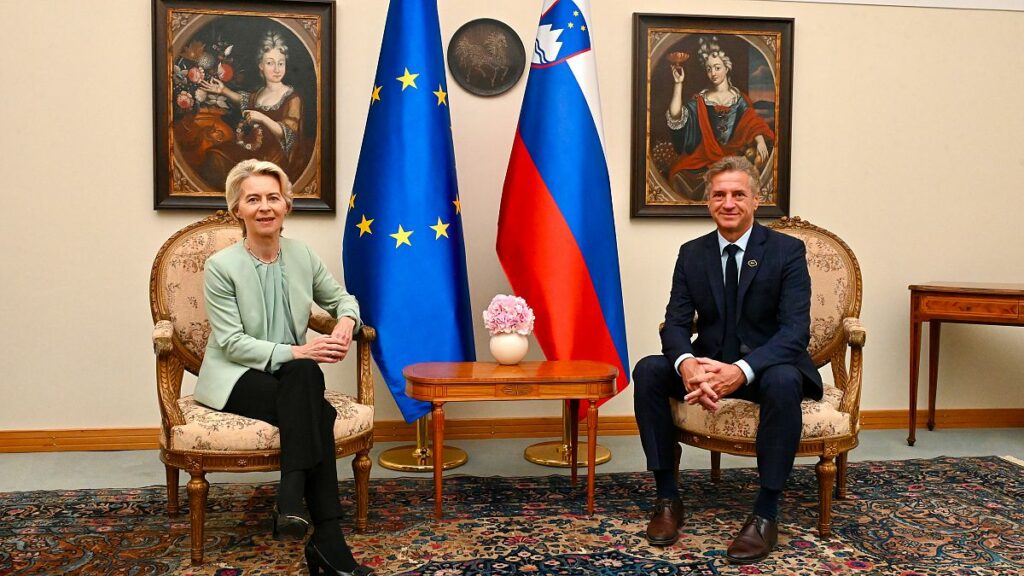Ursula von der Leyen, the Commission chief who’s been appointed to serve another term, has asked national governments to send in nominations; once she has the full list, she’ll announce the portfolios they’ll each get.
Under the EU’s treaty, candidates to serve in the EU’s executive have to be competent, independent and committed to Europe. But von der Leyen needs to double check she’s getting high-quality names, as MEPs will pore over those criteria when deciding whether to approve the new executive.
She’s said she wants people with senior experience in government, diplomacy or EU institutions – and has pushed back on a number that don’t fit the bill, in particular when they jeopardised her goal of gender balance.
Exactly how each country selects its nominee varies – and sometimes becomes a political hot topic.
In Slovenia’s case, the candidate, diplomat Marta Kos, was only officially selected by the government on Monday 9 September, after a last minute swap-out of Tomaž Vesel.
Vesel, ex-head of the national Court of Auditors, was originally proposed before the summer, a decision re-confirmed by the government as recently as last week (3 September), before Ljubljana relented and agreed to send a woman.
That U-turn is creating a political storm in Slovenia, which threatens to further delay von der Leyen’s plans.
By law Kos must now attend a hearing of the Slovenian National Assembly’s EU Affairs Committee, which had originally been scheduled for tomorrow (13 September).
Though lawmakers’ views are non-binding, the chair of the committee Franc Breznik has threatened to delay the hearing by as long as two weeks while he gets more details about the pressure the government put on Vesel to step down, according to Slovenian media.
Commission spokesperson Eric Mamer gave events in Slovenia as the official reason for the delay in presenting the full slate of candidates and their portfolios originally due this week (11 September).
Kos’ hearing conveniently gives von der Leyen a few more days to tweak her top team, not least given concerns from left-wing MEPs over gender balance and policy assignment, but Breznik’s threat could imply a much bigger delay.
In other countries – such as Lithuania – the procedure is rather different: the choice has to be endorsed by lawmakers, after being agreed by both prime minister and president, something that’s created its own headaches.
The original top-tipped candidate, foreign minister Gabrielius Landsbergis, had to bow out after independent-minded President Gitanas Nausėda threatened to veto.
Yet that complexity may well be the reason why Vilnius didn’t fulfil von der Leyen’s demand to put forward both a male and female name for the post.
“In the Lithuanian case, we have such a complicated nomination procedure that for us even to nominate one candidate is quite a challenge,” former Prime Minister Andrius Kubilius told Euronews after he was eventually selected as Lithuania’s pick. “To nominate two candidates, perhaps it would be almost not an achievable result.”
In other places, such as the Netherlands, lawmakers only need to be informed of the Commission nominee – as Prime Minister Dick Schoof did just before re-appointing Wopke Hoekstra.
Hoekstra was for some a surprising choice because Christian Democrat Appeal, the party he previously led, is not among the four in Schoof’s coalition.
Formally speaking, that didn’t bar the government from choosing him, and Schoof may have felt that naming an incumbent already close to von der Leyen upped his chances of getting a good portfolio.
In other places, there isn’t consensus over exactly how to pick their Commissioner – and the choice can represent a political minefield.
In France, picking a candidate has traditionally been seen as a prerogative of the president, as part of his responsibility for foreign policy.
That’s what Emmanuel Macron did before the summer, when he apparently told European Council counterparts of his intention to renominate Thierry Breton for the role – but his decision, taken during an unprecedented lacuna in French politics, proved explosive.
In a series of fiery interventions on French radio, Marine Le Pen, his rival from the far-right National Rally party, called his decision “a kind of administrative coup d’etat”, adding that “it’s the prerogative of the Prime Minister to name the European Commissioner.”
At the time, France was in the middle of legislative elections in which Le Pen hoped her party would seize control.
In reality, nobody gained a majority; France lumbered on with a caretaker government during a two-month period in which the Breton nomination was formalised, before Macron picked centre-right Michel Barnier for Prime Minister.
In Belgium, meanwhile, the choice of Commissioner is just another element of the four-dimensional chess game that leads to the formation of the government.
No clear winner emerged from June federal and regional elections, leading to extensive coalition negotiations. During those talks, parties are allocated points based on seat shares which they spend on prestigious positions – of which EU commissioner is just one, alongside the Prime Minister and other government roles.
The complexity of that process means Belgium already holds the world record for time spent without a government – and it’s also why the country was the only one to miss von der Leyen’s 30 August deadline to pick a name.
It eventually settled on French-speaking liberal foreign minister Hadja Lahbib as its EU candidate, as five-party talks to form a federal government collapsed and restarted.
Source link : https://www.euronews.com/my-europe/2024/09/12/how-do-countries-select-their-eu-commissioners-breton-hoekstra-leyen-european-commission
Author :
Publish date : 2024-09-12 07:00:00
Copyright for syndicated content belongs to the linked Source.
